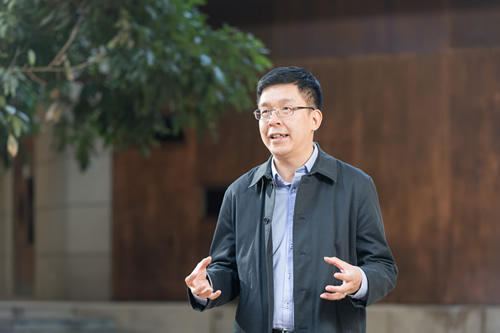Prof Chen Hon-fai helps students to analyse and apply the theories of sociology in practical settings
Prof Chen Hon-fai
Assistant Professor, Department of Sociology and Social Policy

As teachers, we need to be involved with our hearts, but at the same time detached in our minds.
Prof Chen Hon-fai
For many Hong Kong students, acquiring knowledge with no obvious or direct link to their major or likely future profession can seem questionable. But Prof Chen Hon-fai, Assistant Professor in the Department of Sociology and Social Policy, thinks otherwise. Teaching both contemporary and classical theories, he makes the works of influential thinkers like Karl Marx, Max Weber and Émile Durkheim come alive and gives them practical relevance for the modern world.
Connecting the past and the present
Besides explaining the principles and history of the subject, he also introduces ideas and opinions expressed by thinkers such as Michel Foucault, who are better known for their contributions in other fields or disciplines.
"It’s a way for us to involve our students and get them think," Prof Chen says. "I want them to broaden their horizons and not just stay within the confines and traditions of sociology."
Therefore, a key objective is to make theory relevant to everyday life. As an example, Prof Chen might not require students to read Karl Marx’s Das Kapital from cover to cover. Instead, he might ask them to show how Marxism has influenced other concerns about social justice, such as the environmental movement or feminism, both of which can be read as critiques of capitalism.
"In this way, I help them relate Marx, a towering figure but a ghost from the past, to the issues of today’s world,” he says. “This helps them to understand what was so unique about Karl Marx’s own day and to put his theories into a historical context."
Prof Chen also cites the example of Max Weber, who examined the influence of the Protestant work ethic on the rise of capitalism. In this case, rather than looking at western business leaders of the time, he might ask the class to consider the rise of capitalism in a Chinese context against the background of the Confucian work ethic.
Another popular exercise sees students researching biographical details of some of the latest generation of Chinese industrialists and entrepreneurs. The aim is to see if they have been influenced by Confucian ethics and decide what lessons can be drawn about capitalism in a Chinese context.
"Through this exercise, we can not only show how a sociologist would tackle the issue of capitalism and the work ethic in the spirit of Max Weber. We can also show how Confucian ethics and the spirit of capitalism are not something just you read about in a textbook."
Cultivating rationality
Even though Prof Chen has only been a full-time professor at Lingnan for four years, he received a Teaching Excellence Award in 2016, and has already had many great experiences during his time at the university.
One of the most memorable came during the "Umbrella Movement" in 2014, when many students and social science teachers were confused about the protests and even the future of Hong Kong. "We initiated a forum on the movement and its implications for society here," he says. “We wanted to do it in a non-confrontational, less provocative way, from the perspective of social science.”
The forum was very well received, with about 200 students, professors and alumni taking part. "We were not trying to impose our view on anyone. The intention was to create a very open, free atmosphere, in which everyone was eager to speak."
This, Prof Chen believes, is the right way for teachers to cultivate a more rational attitude among students. In such instances, it’s not about how to change society all at once, but about diagnosing the major problems, addressing root causes, and investigating workable solutions.
"You have to adopt a rational perspective, especially on controversial subjects such as this,” he says. “As teachers, we need to be involved with our hearts, but at the same time detached in our minds."